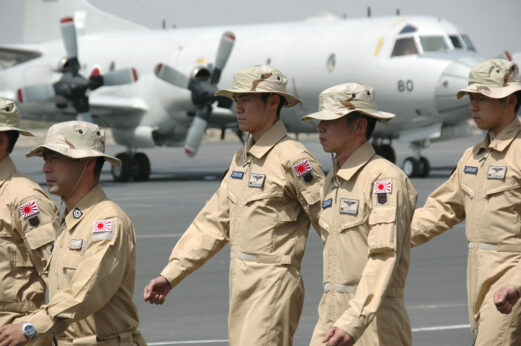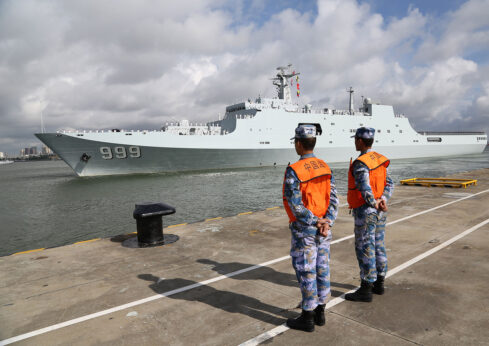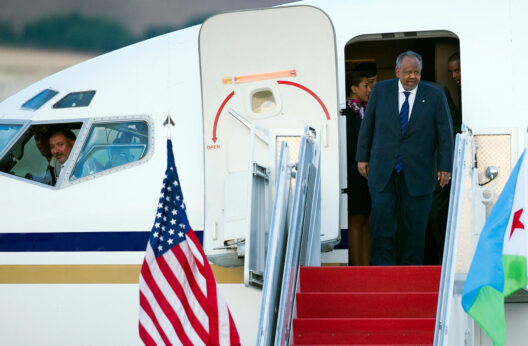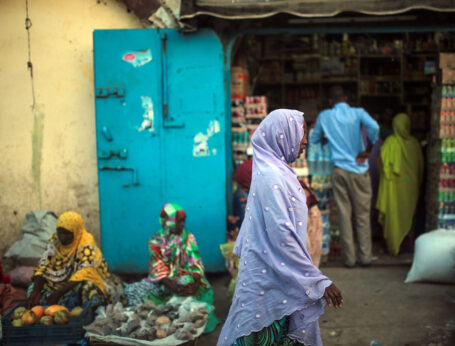
The Republic of Djibouti is located on the African shore of the Red Sea, at the southern entrance of this important waterway that passes through the Suez Canal, in Egypt. Djibouti is a country of modest size, but big geopolitical significance, especially when its proximity to Sudan, South Sudan, Kenya, and Uganda, is considered. Moreover, it is part of a greater geopolitical configuration as a member of the Intergovernmental Authority for Development (IGAD)—the eight-country trade bloc on the Horn of Africa.
Djibouti has a singular strategic dimension with obvious interests to U.S. imperialism. It controls, with Yemen, the Strait of Bab-el-Mandab, the minimum width of which is 30km and through which passes 10% of total world trade. Nearly 19,000 ships used the strait in 2020. The Bab-el-Mandab overlooks the entrance to the Gulf of Aden and the Indian Ocean. Not far away, two other gulfs, that of Oman and its Arab-Persian counterpart, linked by another strait, Hormuz.

This geographical advantage explains why so many international powers have installed military bases in Djibouti. France (a colonial power that remains influential) and the U.S. gained a foothold there in 2002, followed by Japan in 2011, then Italy in 2012. The latest arrival, right on its Silk Road, is China, which obtained its base in 2017. We also can’t forget to list the EU anti-piracy operation Atalanta, which has been in place since 2008, or the German, Spanish, and Dutch soldiers to whom Djiboutian soil is not unknown. Saudi Arabia has a presence, and Russia and India are rumored to be eyeing bases of their own.
For Japan and China, the military installations here are their first overseas bases, while for the U.S., it is the country’s only permanent military base on the African continent. These bases are all sources of rent and other income for the local market (rental of housing, commercial purchases, etc.). The total annual amount of base rents varies, a sign of insufficient transparency, but it is estimated to be no less than $128 million USD.
As one might imagine, Djibouti’s strategic position attracts not only military bases but also the attention of certain economic operators. Thus, seduced by the port prospects of the country, which has become the main corridor for Ethiopian traffic since the Ethiopian-Eritrean war of 1998, Dubai Ports International, renamed Dubai Ports World, forged links with the local dictator, Ismail Omar Guelleh, and in 2000, was entrusted with the management of the country’s only international port and airport.
From this partnership, two new ports were born. In Doraleh, on the outskirts of the capital, Djibouti-ville, there is now a container terminal and an oil terminal. There is also a dry port, closer to the old port of Djibouti, near the presidential palace.
Another partnership has followed, this time with China, which has been generous in making non-concessional loans to the Djibouti government. Port developments, including a multipurpose port at Doraleh to replace the old port, the reconstruction of the Djiboutian portion of the railway connecting the capital to its Ethiopian counterpart, Addis Ababa, and a drinking water supply system from Ethiopian territory are the main projects that have emerged with Chinese blessing. Djibouti also owes China’s Exim Bank around $1.5 billion USD.
A brief history of Djibouti
How did Djibouti get to where it is today?
Since its independence from France in 1977, Djibouti has only known two presidents—Hassan Gouled Aptidon and the latter’s nephew, Ismail Omar Guelleh, who succeeded his uncle in May 1999. Guelleh was Aptidon’s chief of staff and had been entrusted with national security in the aftermath of independence. State power thus passed from an aging uncle to his nephew, a former policeman in the colonial administration. So much for the values and principles of democracy.
From 1977 to 1992, a one-party system reigned in both law and practice, and this situation is ongoing. Thus, even with the creation of its constitution in 1992, Djibouti has not gained democracy. Elections were never free nor democratic since the election of Guelleh in 1999. Additionally, the presidential election of 2021 did not meet basic democratic standards. The opposition boycotted the ballot, and Guelleh could not even generate alibi candidatures, except for that of someone identified as one of his extended family members. Therefore, with no opposition, he was elected with a total vote count of 97.44%.
Following Djibouti’s independence from France, it was pertinent for the U.S. to pursue formal diplomatic relations with this strategically located country. Eventually, this resulted in the only enduring U.S. military presence in Africa at Camp Lemonnier—established permanently by formal agreement in 2003—with access to Djibouti’s port facilities and airport.
The U.S. Agency for International Development’s (USAID) Food for Peace program maintains a warehouse for pre-positioned food assistance commodities in Djibouti, which serves as a hub for rapid response in parts of Africa and Asia. Also, International Broadcasting Bureau facilities in Djibouti transmit Arabic-language programming, and Voice of America Somali Service broadcasts to the Horn and the Arabian Peninsula.
By allowing the U.S. military to set up its base in 2001 (as part of its “War on Terror”), it became the first major superpower tenant in Djibouti. Staying in Djibouti costs the U.S. some $63 million USD annually, which—combined with revenue from France’s military base—enabled Djibouti to stabilize its economy, as the rent base accounts for 18% of its GDP.
The battle for influence in Djibouti
However, since the turn of the century, a new competition has developed for local loyalties in Djibouti from China, which is increasingly building its relationships across the continent.

In 2017, China’s People Liberation Army (PLA) opened its first overseas base in Djibouti. This grey concrete complex sits on a prime location next to one of Djibouti’s main ports and is just a 15-minute drive from the U.S. military base.
One (anonymous) U.S. AFRICOM official stated that the physical PLA presence in Africa is becoming a long-term strategic concern for America. “They (China) have upped their game, in plain language, and ultimately they are offering things that our partners want, that our partners need; in places, we have concerns we are being out-competed.”
Chinese President Xi Jinping made it clear at a high-level summit in Beijing last September that his country is pursuing a “comprehensive strategic and cooperative partnership” with Africa. It includes a $60 billion USD package of aid, investment, and loans to countries on the continent.
For years, China has been expanding its military ties in Africa through extended peacekeeping missions, military personnel training, and the China-Africa Peace and Security Initiative forum. Chinese Foreign Ministry spokesman Geng Shuang said in 2017 that the Djibouti base was part of ongoing efforts to help bring peace and security to the region. He added that the base would help China fulfill its international obligations and promote economic and social development in Djibouti.
The U.S., naturally, views the base with unease, given its proximity to Camp Lemonnier and Djibouti’s main container port, which is the primary source of supplies to sustain the 4,000 U.S. personnel on the base. Ninety-eight percent of the logistics support for Djibouti, as well as Somalia and East Africa, come through that port. Therefore, access is essential, and its loss would be a devastating blow to U.S. imperialist interests and operations.
Wake Forest University Assistant Professor Lina Benabdallah, whose research focuses on China-Africa relations, has observed a growing lack of trust between Washington and Beijing which is taking on global dimensions. She recently commented that “China has been operating (in Africa) for the better part of two decades now and has been doing so in a very smart way, with really close networks and connections that have been in work for several years.” She warned that the U.S. viewed China’s investment program as a front for a more sinister motive of establishing a military footprint worldwide—an instance of the pot calling the kettle black.
Djibouti politics now

Guelleh is now 73 and has enjoyed 20 years of unchallenged power. He has had plenty of time to end the recurring violations of human rights and restore public freedoms and set up the independent joint national electoral commission provided for in the framework agreement signed with the opposition in 2014.
Such a body is provided for by the African Charter on Democracy, Elections, and Governance, signed and ratified by Djibouti, and would have ensured a transparent election and provided real candidates with real projects, but he chose a fifth electoral masquerade and a fifth illegitimate mandate.
Unemployment is massive, affecting 60.5% of 15-34-year-olds. Poverty has gone from 41.1% in 1996 to 79.4% in 2012. Access to running water and electricity is inadequate, and the level of education is poor. The health system cannot cope with malnutrition and diseases, such as malaria, choleriform diarrhea, chikungunya fever, etc., are rife. And of course, there is the COVID-19 pandemic. The Human Development Index (HDI), published each year by the United Nations, does not contradict this situation: the country was ranked 171 out of 189 for 2018. In 2006, in a report on the country, the International Federation for Human Rights (FIDH) noted: “Djibouti is a rich country but Djiboutians are poor.”

Guelleh prefers to govern through poverty and force. He has a stranglehold on the country’s resources and absolute control over state power. In 2004, a note from the diplomatic mission of the U.S. stated: “Djibouti is less a country than a commercial city-state controlled by a man, Ismail Omar Guelleh.” He has become one of the richest presidents in Africa, yet he is still feted by imperialist world powers. In February 2021, a few weeks off his fifth electoral masquerade, he made an official visit to France, where President Emmanuel Macron said how “attached he is to democracy and African youth,” receiving him as a worthy and legitimate head of state.
Djiboutians do not intend to resign themselves to the fate inflicted on them by this man and his associates. They know that salvation is in their hands. They know that a national leap is needed to achieve this. There is no lack of resistance fighters who have been educated by the struggle. The words, “Hope does not die, cannot die,” are heard in the hovels in Djibouti-ville and in the interior regions, and they are growing louder.
Djiboutians want to end the deadly links between international militarism and local nepotism. They believe that a true Republic of Djibouti—without Guelleh—democratic, inclusive, and prosperous—is possible.










